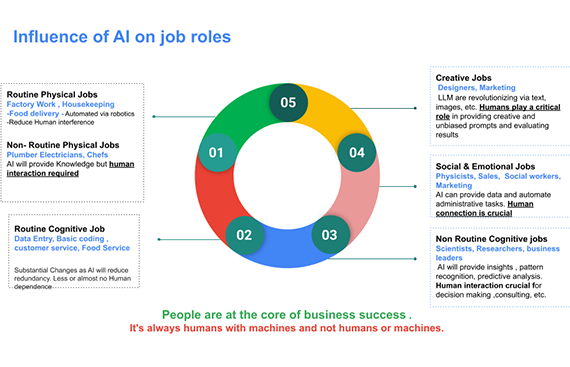In a rapidly evolving technological landscape, Ashwin Tambe, a prominent figure in AI enablement and delivery management at Google, is leading the charge towards integrating generative AI to augment human capabilities in the workforce. Speaking at the 2nd Symposium on AI Opportunities and Challenges (SAIOC), held online on June 18, 2024, and co-hosted by Mid Sweden University, The University of Gävle, and EM Normandie, Tambe delivered a compelling presentation titled “Beyond Automation: How Generative AI Augments Human Capabilities in the Workforce,” shedding light on the transformative potential of AI. The symposium brought together thought leaders to explore the transformative impact of AI across various societal dimensions. Featuring keynote presentations and open discussion sessions, the event addressed topics ranging from AI ethics and environmental issues to productivity improvements and criminal justice policy. It underscored the significance of AI in shaping the future and encouraged contributions from diverse fields such as academia, business, and digital marketing.
Revolutionizing the Workplace
Tambe’s presentation at SAIOC was a highlight of the event, capturing the attention of industry leaders, tech enthusiasts, and corporate executives. He delved into the pervasive question on everyone’s mind: Is AI taking our jobs? Through an anonymous poll conducted at a corporate convention, Tambe revealed that a significant 64% of professionals view AI as a positive step for the future, suggesting that AI could indeed create new job opportunities while transforming existing ones. “AI is not just about automation; it’s about augmentation,” Tambe emphasized. “Generative AI can analyze vast amounts of data, increase productivity, and enable better decision-making, thereby freeing up humans to focus on more creative and strategic tasks.”
Key Insights from the Symposium
Tambe highlighted several real-life use cases where AI is making significant strides. In the retail sector, AI applications like chatbots and predictive modeling are enhancing customer experiences and optimizing operations. In healthcare, AI is revolutionizing patient care through advanced diagnostics and treatment methods. Manu- facturing industries are also witnessing increased efficiency and innovation in production processes due to AI-driven automation.
One of the most intriguing aspects of Tambe’s talk was his focus on the untapped potential of generative AI. According to a study by Deloitte, while AI adoption is increasing efficiency by 56% and improving services by 29%, the idea generation is still at a mere 19%. Tambe believes this presents a huge opportunity for businesses to explore new frontiers with AI.
Impact on Job Roles
Tambe’s analysis extended to how different job roles will be influenced by AI. Routine physical jobs, such as factory work and housekeeping, are likely to be automated, reducing human intervention. Non-routine physical jobs, including professions like plumbing and electrical work, will still require human interaction, though AI can assist with knowledge. Routine cognitive jobs, such as data entry and basic coding, will see substantial changes, with AI reducing redundancy. For non-routine cognitive jobs, like those of scientists and business leaders, AI will provide valuable insights and pattern recognition, but human decision-making remains crucial. Creative jobs, particularly in design and marketing, will benefit from AI enhancements, though human input remains essential for creativity and innovation. “AI will not replace humans but will work alongside us, augmenting our capabilities and allowing us to focus on more strategic and creative endeavors,” Tambe noted.

Relevant Research: Generative AI and the Future of Workforce in Marketing
Ashwin Tambe’s paper, “Generative AI and the Future of Workforce in Marketing,” published in the International Journal of Computer Trends and Technology, further explores the impact of AI on marketing roles and strategies. The paper examines how Generative AI can automate repetitive tasks, analyze vast datasets, and generate personalized content, ultimately augmenting human capabilities in creative and strategic endeavors. This research provides valuable insights into the symbiotic relationship between humans and AI, highlighting the potential for AI to complement human strengths and unlock new opportunities in the marketing field.
Ashwin Tambe’s vision for the future of work with AI integration, presented at SAIOC, offers a comprehensive look at the transformative power of AI and the strategic steps necessary for adapting to this new landscape. By embracing AI as a tool for augmentation rather than replacement, we can navigate the future with confidence, leveraging technology to enhance human creativity, productivity, and decision-making.
Preparing for the AI Future
In concluding his presentation, Tambe offered a strategic approach for adapting to AI. He emphasized the importance of lifelong learning, encouraging professionals to stay updated with the latest advancements and to increase their data literacy. Critical thinking is also essential, as individuals must assess the ethical impacts of AI and recognize its broader influence on society. Additionally, creative problem-solving skills will be crucial for integrating AI into innovative strategies, such as using AI-generated content and personalized recommendations to enhance marketing efforts. “AI is here to stay, and it’s imperative that we embrace it as an enabler, not a replacer,” said Tambe. “Our goal should be to augment our skills and automate mundane tasks, allowing us to focus on what truly matters.”
Looking Ahead
Ashwin Tambe’s insights at the SAIOC have set the stage for a broader discussion on the future of work and the role of AI. As businesses and individuals navigate this new landscape, Tambe’s vision of a partnered approach to AI and human capabilities offers a roadmap for harnessing technology to drive growth and innovation. The presentation underscored the importance of balancing AI integration with human oversight and creativity, ensuring that technological advancements serve to enhance, rather than diminish, the human experience.


